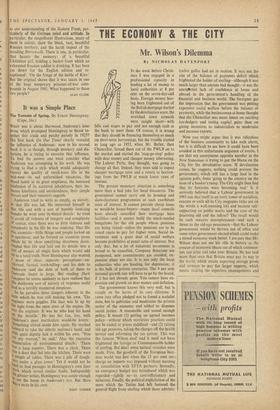It was a Simple Place
The Torrents of Spring. By Ernest Hemingway. (Cape, 16s.) WHAT was it about Sherwood Anderson's later Prose which prompted Hemingway to throw to- gether this crude and patchy parody in 1925? His first book (In Our Time) clearly revealed the influence of Anderson: now in his second book it is as though, through mockery and dis- tortion, he is trying to exorcise that influence. To find the answer one must consider what Anderson was attempting in his work. He was trying to find a style which would adequately Convey the quality of small-town life in the Mid-west—its sad unfurnished vacancies, the dread latent in its great emptiness, the bemused confusion of its scattered inhabitants, their im-
tnense loneliness and unrelatedness, their simple virtues and their innocent anguish.
Anderson tried to write as simply, as naively, as that life was led. He immersed himself in that life and with a sort of humble itemising Wonder he went over its tiniest details : he tried to avoid all richness of imagery and complexity of syntax, since there was so little richness and complexity in the life he was studying. That life Was atomistic—little things and people locked up
apartness; and he formed an atomistic prose Which by its close specifying directness disen- tangled that life and laid out its details into a sort of mosaic of single facts which would add UP to a total truth. Now Hemingway also wanted a prose of clear, separate, perceptions—un- adorned, factual, truth-telling--and his debt to Anderson (and the debt of both of them to °extrude Stein) is large. But reading Dark this he seems suddenly to have realised that :Ms deliberate sort of naivety of response could lead to a terribly mannered simplesse.
So he parodies these dangers inherent in the style which he was still making his own. 'The engineer wore goggles. His face was lit up by the light from the open door of the engine. He Was the engineer. It was he who had his hand °An the throttle.' He has his fun, too, with Anderson's poor inarticulate would-be lovers: Something stirred inside him again. He reached
,
t°,rward to take the elderly waitress's hand, and Wan quiet dignity laid it within his own. "You are my woman," he said.' Also the excessive enumeration of environmental details: 'There was a long counter. There was a clock. There was a door that led into the kitchen. There were a couple of tables. There was a pile of dough- hass under a glass cover.' Yet it would not be d to find passages in Hemingway's own later work which reveal similar faults. Indisputably t e greater writer, Hemingway was astute enough t"° see the beam in Anderson's eye. But there was a mote in his own.
TONY TANNER






























 Previous page
Previous page